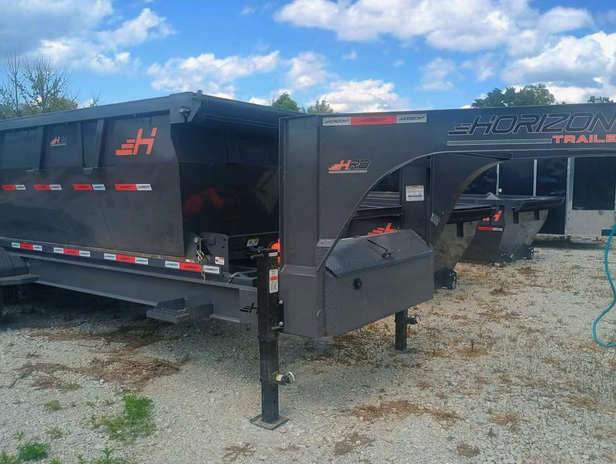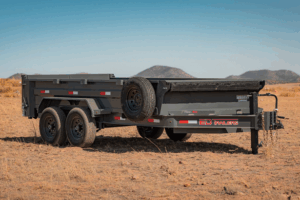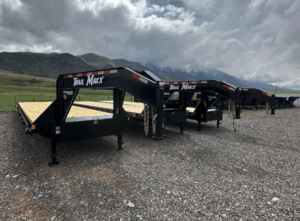Choosing between a gooseneck and a 5th wheel trailer setup is a big decision for anyone hauling serious weight.
Plenty of haulers — from RVers and ranchers to contractors and weekend warriors — eventually reach this crossroads. Both trailer hitch systems have a lot going for them, but which one is right for you really depends on your towing vehicle, the type of trailer you’re pulling, and how you plan to use it. This post breaks it all down in plain English so you can make the right call without second-guessing yourself.
Let’s start by taking a closer look at what makes a gooseneck trailer unique.
What Is a Gooseneck Trailer Setup?
Gooseneck trailers are a favorite among people who haul heavy stuff regularly — livestock, construction equipment, big loads of hay, you name it. They get their name from the long “neck” that extends up and over the tailgate of your truck, connecting to a ball hitch mounted in the bed. That hitch sits right over the rear axle, which gives you better stability, smoother weight distribution, and tighter turning.
One big plus? Most gooseneck hitches use safety chains, giving you an extra layer of security while towing. And because the setup doesn’t take up much space in the bed, especially if you’re using something like a CURT gooseneck system or a GEN-Y gooseneck hitch, you get more versatility from your truck when you’re not towing.
Here’s why people like goosenecks:
- They’re built to haul heavier loads — often up to 30,000 pounds
- The hitch design gives you a better turning radius and less sway on the road
- You can disconnect quickly and still use your truck bed freely
Gooseneck trailers also come in more industrial flavors: think flatbeds, livestock haulers, and heavy-duty dump trailers. They’re tough, reliable, and made to work — perfect for farms, job sites, or anyone who pulls serious weight often.
What Is a 5th Wheel Trailer Setup?
If goosenecks are built for work, 5th wheels are built for comfort — especially when it comes to RVing and long-distance travel.
A 5th wheel trailer connects to your truck using a big, flat hitch plate (kind of like what you’d see on a semi-truck). This hitch mounts in the bed of your pickup, right over the rear axle, and locks into a kingpin on the trailer. The result? A super stable, smooth ride that’s great for pulling large campers or enclosed trailers over long distances.
Where 5th wheel trailers really shine is interior space and livability. Because the hitch sits higher and farther forward in the bed, 5th wheel campers can have taller ceilings, upper-level sleeping areas, and slide-outs that make the whole space feel like a small apartment. For RVers, that’s a game-changer.
Here’s why people choose 5th wheels:
- They’re easier to tow than bumper-pull trailers, especially for larger rigs
- The ride is smoother — great for fragile cargo or living quarters
- They offer better interior layouts for campers and toy haulers
One thing to keep in mind: 5th wheel hitches are bulkier than gooseneck hitches, and they usually stay installed in your truck bed — meaning you lose some of that usable space unless you remove it. And while many RV parks are designed for 5th wheels, they’re not usually the go-to for work sites or commercial hauling.
Still, if you’re planning to live on the road or just want a super stable tow for your weekend adventures, a 5th wheel trailer might be exactly what you need.
Gooseneck vs 5th Wheel: Direct Comparison
Now that we’ve looked at each setup on its own, let’s put goosenecks and 5th wheels head-to-head. The truth is, they’re both great options — just in different ways. Here’s how they stack up when it comes to real-world performance.
Towing Capacity and Trailer Weight
Gooseneck trailers usually win this round. They’re designed to haul seriously heavy stuff — often up to 30,000 pounds or more, depending on your truck and hitch setup. That makes them ideal for things like livestock, equipment, or extra-long flatbeds.
5th wheels, while strong, tend to top out a bit lower — typically in the 16,000 to 20,000-pound range for most consumer-grade setups. That’s still plenty for a big RV or enclosed trailer, but not quite the same brute strength as a gooseneck.
Turning Radius and Maneuverability
Gooseneck trailers offer a tighter turning radius, especially with short-bed trucks and complex backing situations. Because the hitch uses a ball-and-coupler design, it allows for tighter turns in tight spaces like job sites, farms, or narrow gates.
5th wheels, on the other hand, feel smoother when towing at highway speeds and are often more forgiving when backing into campsites or parking lots, especially with practice. A flexible gooseneck adapter can help 5th wheel owners replicate some of this turning efficiency, but it’s not quite the same.
Hitch Setup and Bed Space
Gooseneck hitches are smaller and less intrusive. Once installed, the ball sits nearly flush with your truck bed, and many systems even fold down or pop out when not in use. That means more usable bed space when you’re not hauling.
Fifth wheel hitches are bulkier. They take up a chunk of your bed and are usually harder to remove — not a big deal if you’re hauling full-time, but something to think about if you need your bed space during the week.
Ride Quality and Stability
This one’s close, but 5th wheels usually offer a smoother ride, especially for passengers inside an RV. The kingpin-style connection distributes weight differently and reduces some of the jostling that can come with a gooseneck ball hitch.
If you’re hauling cargo that doesn’t care about bumps — like hay bales or steel beams — that smoother ride might not matter much. But if you’re towing living quarters or fragile equipment, it could be a deciding factor.
How to Choose Based on Your Use Case
At the end of the day, the “right” trailer setup depends on what you actually plan to do with it. Here’s how to think it through based on your lifestyle, cargo, and truck setup.
Full-Time RVing or Weekend Adventures
If your goal is to travel in comfort — whether part-time or full-time — the 5th wheel is almost always the better fit. The ride is smoother, the interiors are roomier, and they’re made for people who live out of them. Plus, RV parks and campgrounds are designed with 5th wheels in mind, so navigating and setting up is generally easier.
Go with a 5th wheel if:
- You want a spacious RV with slide-outs and multiple levels
- You’ll be traveling long distances regularly
- Comfort and living space matter more than truck-bed usability
Farming, Ranching, or Commercial Hauling
Gooseneck trailers were built for this kind of work. They can haul more weight, handle rougher conditions, and offer better maneuverability when space is tight. Whether you’re hauling livestock, hay, or heavy machinery, a gooseneck just makes more sense.
Go with a gooseneck if:
- You haul large or heavy loads for work
- You need a trailer that turns tight and backs easily
- You want to keep your truck bed usable when the hitch isn’t in use
Truck Compatibility and Bed Design
This one’s easy to overlook, but it matters. Not all trucks are ready to handle a 5th wheel hitch, especially if you have a short-bed truck. While you can get sliding hitches to make it work, goosenecks are often a better fit for shorter beds and single-rear-wheel trucks because of their tighter turning radius.
If you already have factory-installed 5th wheel prep or a gooseneck ball kit, that may also sway your decision.
Cost and Long-Term Value
Gooseneck hitches are usually cheaper to buy and install. They’re simpler, less intrusive, and easier to maintain. 5th wheel hitches cost more up front and may require more modification to your truck bed.
That said, 5th wheel trailers tend to hold their value better because they’re in high demand in the recreational market.
Expert Recommendations: What to Buy and When
So now you know the nuts and bolts, but what if you’re still stuck between the two? Let’s break it down with some real-world scenarios and clear recommendations based on what experienced haulers and trailer dealers often suggest.
If You’re an RVer or Weekend Traveler…
Go with a 5th wheel.
The smoother ride, bigger interiors, and camper-friendly hitch system make 5th wheels the top choice for RV life. They’re more comfortable for long hauls, easier to live in, and designed with travel in mind. Most full-timers or serious weekend warriors wouldn’t even consider a gooseneck unless they’re pulling a custom toy hauler or a hybrid setup.
Recommended setup: 5th wheel RV camper with a long-bed truck and fixed hitch.
If You’re Hauling Livestock, Equipment, or Construction Materials…
Go with a gooseneck.
They’re built to handle tough jobs and high weights, and they’re easier to maneuver on farms, job sites, or narrow country roads. Many ranchers and contractors stick with gooseneck flatbeds, dump trailers, and livestock trailers because they’re reliable and low-fuss.
Recommended setup: Gooseneck flatbed or stock trailer with a ¾-ton or 1-ton truck.
If You Need Versatility and Use Your Truck for Other Jobs…
Leaning toward a gooseneck might be your best move.
Because gooseneck hitches take up less bed space and are easy to remove or fold down, they’re ideal if you switch between towing and using your truck bed for hauling tools, lumber, or gear. A removable 5th wheel hitch can work, too — but it’s bulkier and more of a hassle to install and uninstall.
Recommended setup: Gooseneck trailer with a flip-over ball hitch in a long-bed truck.
When Both Could Technically Work…
If you’re towing something like a toy hauler or car hauler — and both trailer styles are available — think about your priorities. Do you want comfort and smoother towing (go 5th wheel)? Or durability and higher hauling capacity (go gooseneck)? There’s no wrong answer, but the details matter.
Final Verdict: Which Trailer Setup Belongs in Your Driveway?
When it comes to choosing between a gooseneck and a 5th wheel, it’s not about right or wrong — it’s about the right fit for your life, your truck, and your towing needs.
At Silverline Trailers, we’ve helped thousands of haulers, ranchers, and RVers find the perfect trailer setup for their exact needs. Whether you’re hauling livestock across the state or heading out on a cross-country adventure, our team knows what works — and we’re here to help you make the right call.
Still weighing your options? The best way to decide is to see what’s out there.
Search our inventory now to browse trailers ready for pickup. Whether you’re hauling for work or planning your next adventure, we’ve got the trailer that fits your life.




